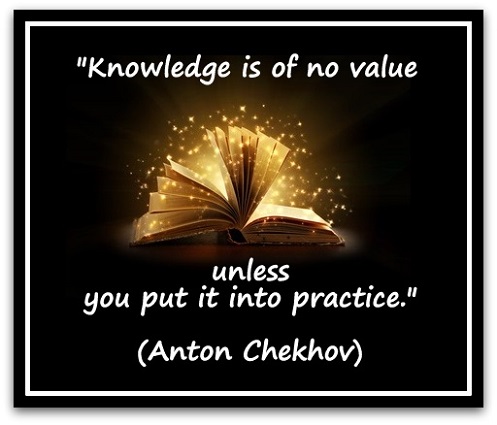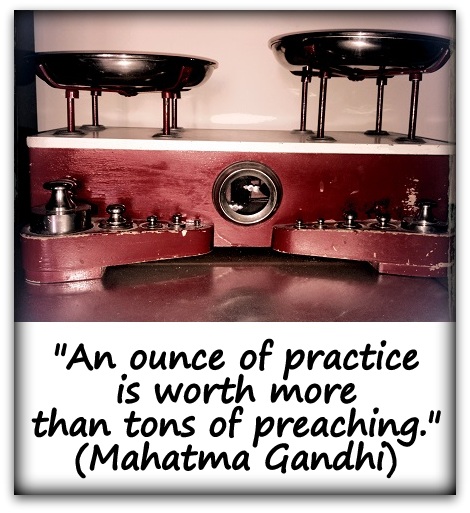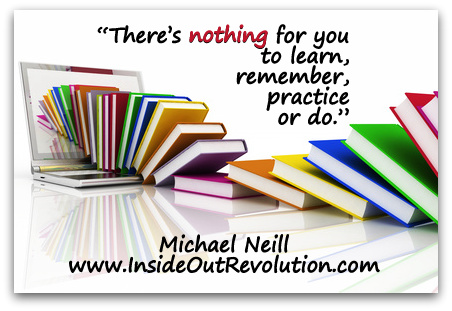Coaching Quote of the Day 6th March 2015

“Knowledge is of no value unless you put it into practice.”
(Anton Chekhov)

“Knowledge is of no value unless you put it into practice.”
(Anton Chekhov)

“An ounce of practice is worth more than tons of preaching.”
(Mahatma Gandhi)

“There’s nothing for you to learn, remember, practice or do.”
Michael Neill
www.InsideOutRevolution.com
Judy Rees asks a question that many new to coaching asks themselves, in this week’s guest post:
By Judy Rees
Are you a coach who actually coaches people? Or are you a perpetual preparer?
I often coach people who are in the process of becoming coaches. I’ve noticed a lot of beginners seem to attend endless workshops and events, learning more and more about how to be a coach, and how to market themselves as coaches, rather than getting on and actually doing it.
Using Clean Language questions and metaphor, I’ll help my clients to understand the pattern – and we’ll frequently discover that on the current plan, they’d never know enough to get started.
As Nicholas Taleb points out in The Black Swan, the more expert someone becomes, the more they realise what they don’t know.
“You will accumulate more knowledge and more books as you grow older, and the growing number of unread books on the shelves will look at you menacingly. Indeed, the more you know, the larger the rows of unread books,” he says.
If you are determined to become a coach, perhaps because you want to help people, it’s important to find a way to manage this. (Just getting a Kindle doesn’t do the trick!)
I like to pride myself on “making change happen, whatever happens” in my coaching work, and I have a pretty solid record of success.
But that success is not just based on knowing a lot of stuff – it’s based on having a coaching methodology that is robust enough to work well, even when I don’t know what’s going on for my client.
At one level, I have to accept, I’ll never know what’s happening. I can’t see the world exactly through my client’s eyes.
And the more clients I have, the more I learn… and the more I realise I don’t know.
If you suspect you might be a perpetual preparer, I’d strongly suggest shifting your attention towards finding a robust coaching methodology that works well for you (Clean Language is my suggestion: others are available) and then getting started.
Practice, get feedback, practice some more, get referrals… and enjoy discovering how much you don’t know.
Judy Rees is an author, mentor and information marketer, and an expert in Clean Language and metaphor. Her blog is at www.xraylistening.com
You can learn Clean Language online, free on Judy’s new website http://learncleanlanguage.com
“Practice random acts of kindness and senseless acts of beauty.”
(Anne Herbert)
“The practice of self-responsibility is one of the pillars of self-esteem.”
(Nathaniel Branden)
Have you ever wondered about the choice of language that many coaches use? One of the ones I particularly like is the choice that many coaches (along with other practitioners) choose to use – having a coaching practice.
This is not going to be a post about how not thinking of a coaching practice as a business can impact upon your business success. For now, I’ll let you consider those implications for yourself. (or you can read some previous posts such as this guest post by Nicky Kriel)
This is going to be a piece about that word practice. A dictionary definition gives more than one meaning for the word including “the professional work, business or place of business of a doctor, lawyer etc.”
I personally think that the one of the aspects that contributes to a professional work or business is being successful in using specific skills.
Looking at the origins and historical use of the word, in the early 15th century the word practice was used as meaning “to perform repeatedly to acquire skill.” It’s this part of a definition that I want to focus upon today.
I speak to many coaches who are at the start of their journey as a coach, some have had more training than others and all are passionate about coaching. Yet some have had more practice than others.
Some may place the “blame” for lack of practice on the structure of training courses or perhaps because of some sort of character flaw such as procrastination. Personally, I don’t think placing the blame is overly useful for the individual in that situation. I’m far more interested in finding a solution that will get that individual coaching more.
The same applies if you have “taken a break” for a while – perhaps you did lots of coaching whilst doing a course but then haven’t done any for a while. Maybe you have got further with your coaching and then you prioritised something else either by choice or necessity.
If you do find yourself in that situation rather than asking why, how about considering the following questions?
What would have to happen so I can practice my coaching more?
What is the very first thing that I could do?
The answers to those questions will very easily vary from person to person:
Sometimes what is actually stopping a coach from practicing more is the question of “When to start charging?” I’ve shared in a previous post various different approaches to this question and invited you to see which appealed to you.
Whatever you find your answers to those questions are, I invite you to consider taking action to make a difference for your coaching practice and for your clients, both present ones and your clients in the future.
“Everything is practice.”